Police station
A police station (sometimes called a "station house") is a building which serves to accommodate police officers and other members of staff. These buildings often contain offices and accommodation for personnel and vehicles, along with locker rooms, temporary holding cells and interview/interrogation rooms.
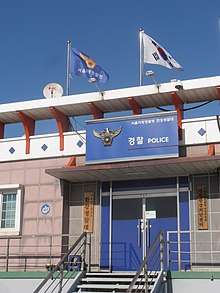
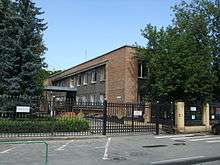
Name
Large departments may have many stations to cover the area they serve. The names used for these facilities include:
- Barracks for many American state police and highway patrol stations and in Ireland.
- District office for the California Highway Patrol.
- Precinct house, or informally precinct, for some urban police departments in the United States such as the New York City Police Department, Memphis Police Department, Newark Police Department, where stations are in charge of precincts.
- Police house
- Police office, especially in Scotland.
- Station house
- Substations are smaller facilities used by many departments, especially county sheriffs.
Multiple informal names exist, such as "cop shop", "cophouse" or (in the UK) "nick".
The area a police station serves has a variety of different names, such as precinct, district, division and zone. However, in some police forces such as Hampshire Constabulary, police stations do not serve a specific area and the officers have great flexibility over where they can operate.
Facilities
Typical facilities at police stations include:
- Office space where officers, detectives and administrative staff can work.
- Cells for detainees. In the UK, the area with cells is known as a custody suite.
- Interview rooms, for both detainees and non-detained visitors.
- Property rooms for storing evidence and seized property.
- Lockers and storerooms for storing equipment.
- A reception desk for public visitors.
- Car park for different vehicles.
- A room for personnel from other emergency services
Specialized stations exist in a number of countries. An example includes women's police stations in Latin America.
Others
Ireland
The police stations (or barracks) of the Garda Síochána come in the following types, in ascending order of size:
- Sub-district stations: Stations in small towns and villages, led by an officer who is no higher in rank than a sergeant. Since the 1980s, many of these small stations have been closed or reduced to operating part-time.
- District headquarters: Located in the largest town in a Garda district, with the most senior officer being a superintendent.
- Divisional headquarters: Located in the largest town or city within a Garda division, which in turn comprises multiple districts. The most senior officer is a chief superintendent.
- Garda headquarters: Located in Phoenix Park, Dublin and includes the office of the Garda Commissioner, as well as other senior officers.
United Kingdom
The county constabularies in Great Britain were previously organised on a village basis. Most villages of any size had a "police house". Police houses in small villages were often staffed by a single uniformed constable, with larger stations being staffed by more. Local police stations were grouped together under the command of a uniformed sergeant, whose station was known as a "sergeant's station". Larger towns in the county constabulary areas had police stations staffed by a number of officers, often under the command of an inspector or superintendent, usually also commanding a sub-division or division respectively, and therefore giving the names of "sub-divisional station" or "divisional station" to their stations.
In Scotland a police station may be referred to as a police office.
United Arab Emirates
As well as traditional, staffed, police stations, there are a number of kiosks in Dubai allowing instant acces to police services via a video touchscreen.
Image gallery
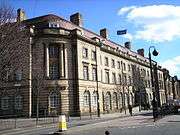 An English police station: Wood Street station in Wakefield
An English police station: Wood Street station in Wakefield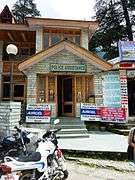 Police Assistance Booth, Manali, Himachal Pradesh, India
Police Assistance Booth, Manali, Himachal Pradesh, India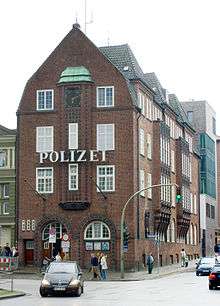

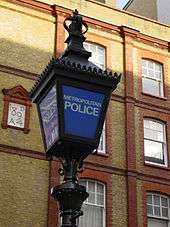 Many British and Commonwealth police stations have a blue lamp outside.
Many British and Commonwealth police stations have a blue lamp outside.- Cells used in Leith Police Station between 1833 and 2003
- J.C. "Buster" Court Public Safety complex in Stafford, Texas
- Police station in Patagonia (southern Chile).
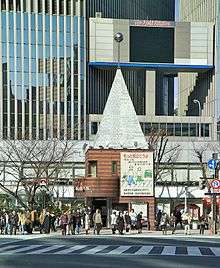
See also
- List of police stations, about notable individual ones
- Custody suite
- Dubai Smart Police Stations
- Property room
| Wikimedia Commons has media related to Police stations. |